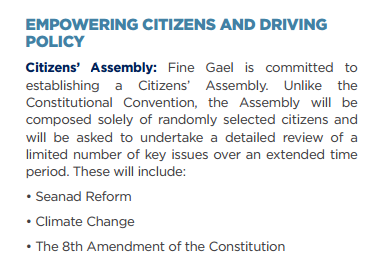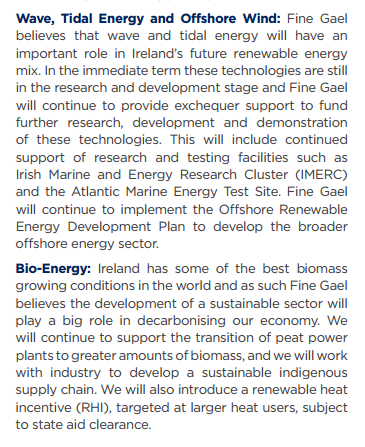Election Diary Feb 19th: Numerous mentions of environment, but sparse detail in Fine Gael Manifesto

February 19th, 2016

With one week to go to polling day, all parties and candidates are now on the home straight. Today’s Election Diary examines the manifesto of the outgoing coalition party Fine Gael for its environmental credentials.
Climate Change
Being one of the larger manifesto documents, there is much mention of climate change. However, it is lacking in detail in places. They plan to instate a long term economic planning unit that will annually consult with the Irish Academy of Engineering on, amongst other issues, the challenge of Climate Change. Compared with Fianna Fáil’s proposal to extend the duration of capital spending plans to 25 years to practically enable long-term projects, this measure is unlikely to play such an influential role.
They propose that forestry will play a large role in mitigating the effects of climate change under the Forestry programme 2014-2020, which would be expanded in line with COFORD recommendations on suitable land. While the carbon content and sequestration potential of soil must be a consideration when planting forestry, a cross-sectoral approach that acknowledges the physical limitations of simultaneously expanding forestry, biomass and the agricultural sector is arguably a more vital prevision.

They are also committed to the establishment of a Citizens’ Assembly, composed of randomly selected citizens, which will undertake detailed reviews of a number of key issues, including Climate Change.
The document states how the Climate Action and Low Carbon Development Act, which was passed late last year, sets out a strategy for a National Mitigation Plan. This plan would cover the four key areas of Electricity Generation, Built Environment, Transport and Agriculture. Examination of their proposals in each of these sectors, however, gives rise to more questions than they answer.
Electricity Generation

The party aims to decrease dependence on foreign fossil fuels by: reviewing and improving the price supports available to producers of renewable energy; involving communities in the planning process of wind developments in particular and supporting them to have a stake in energy projects in their local area where possible; providing funding for research and development in wave, tidal and offshore wind energy generation, and furthering developing our Biomass industry, with some biomass currently being burned at peat power plants such as Edenderry. The absence of targets and figures in these regards, and Bord na Móna’s distant commitment of 2030 to cease burning peat may mean that these energy policies are not firm enough.
Fracking
They are cautious on their policy in relation to Hydraulic Fracturing. They say that no fracking will take place until the results of an EPA study on the controversial method are published. However, this study has been ceased due to concerns over the objectivity of the research, and so the definitive results that Fine Gael expects from this study may not materialise.
Built Environment
In one of their more progressive proposals, Fine Gael would establish a Green Public Procurement plan, which would increase the energy efficiency of buildings and services in the public sector, and have a significant impact on Ireland’s greenhouse gas emissions.
Water Charges
They insist that by 2021 the €5.5bn investment through Irish Water will improve water quality, put a stop to boil notices and end the practice of pumping raw sewage into rivers and seas. They also promise that Irish Water will remain in public ownership. Being in the minority of parties that support water charges, this may be one of Fine Gael’s strongest environmental policies.
Waste
On the subject of waste, the party claims that it will look to implementing a Circular Economy Package that would make us a more resource-efficient economy, but then qualifies this by stating that they will ensure “any targets that are set for Ireland are fair and achievable”.
Transport
The manifesto directly links the importance of an efficient and clean public transport system to “our efforts to combat Climate Change”, and the party commit to investing €3.6bn in public transport during the next capital plan. Following on from recommendations in the Energy White paper, they would increase the number of E-cars on the road. Conversely, the €4.4bn they would invest in maintaining and expanding the road network suggests that their interest in encouraging ‘modal shift’ from private car to public transport may not be sufficient.
Agriculture
This section details plans for measuring sustainability of our food production, the continuation of the Origin Green programme which provides environmental auditing services to food and drinks producers, and an afforestation programme to act as a carbon sink and help us meet our emission reduction targets. Given that we are not in line to meet our national emission reduction targets for 2020 and that the party claims that “Ireland is a world leader in responding to the new challenges of climate change and global food security”, a claim that is contested due to the considerable emissions generated by our agricultural sector and the luxury nature of our exports, Fine Gael may be best advised to bring up the viability of agriculture’s emissions as a matter of urgency at one of their ‘Citizens’ Assemblies’.
[x_button shape=”square” size=”mini” float=”none” href=”http://www.finegael.ie/__uuid/b5055220-ec96-4f03-b18a-4506e8d3119c/manifesto.pdf” info=”none” info_place=”top” info_trigger=”hover”]Click here to read Fine Gael’s Manifesto[/x_button]
[x_author title=”About the Author”]







